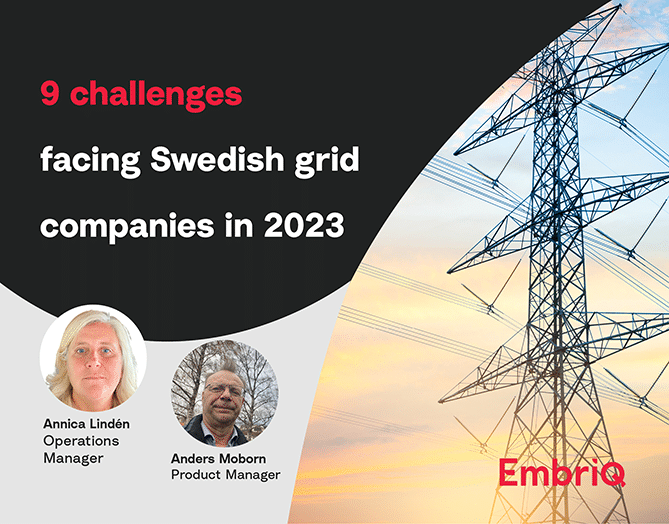1. Local production
The market is changing rapidly, raising a number of issues. “One major issue is local production on the grid (micro-production), typically solar cells on residential buildings. Another is the transition to quarter-hour meter reading. That will mean reconfiguring and changes to IT systems, plus the replacement or reconfiguration of meters over 63 amps,” explains Moborn. Meters have to be switched to quarter-hour level instead of the current hourly level by 1 November 2023. “That could be a problem for many grid companies, because it will require a lot of expert personnel, of which there is a shortage in Sweden,” adds Lindén.
2. Data collection
There will be greater demands on the quality of data collection. The data collection program currently used by the grid companies will have to be able to cope with all reporting being completely changed. This is to be able to display the highest quarter-hour value instead of the highest hourly value. “Very complex demands have been made of grid company personnel within the last 6-7 years alone. We can now see that there’s an expertise shortage when systems, requirements and rules quickly become more complex, and this is where we come in. Embriq has an extremely high level of knowledge and expertise in handling and collecting data,” says Lindén.
3. The Aggregators
A shortage of capacity in the existing electricity grid means that the need for flexibility on the grid is increasing. “That’s why we’re seeing the emergence of a new type of player we call ‘Aggregators’,” says Moborn. “The grid companies can buy flexibility from them to maintain balance on the grid. An Aggregator operates on the grid independently of the grid owner. That puts new demands on the systems, as an Aggregator can create sub-points, known as ‘balance points’, behind the grid owner’s metering system, ” he continues.
4. Skills shortage
Moborn believes there is shortage of expertise and personnel at many grid companies. That may be due to many of them waiting for the Elhub to arrive. But since that’s still some way off, it raises problems for companies that have such skills shortages. “We often see this when we’re working with a customer. It’s much easier for us to come in and work on their system, than for them to hire and train someone new in addition to all the other projects they’re working on,” Lindén continues. “We relieve pressure on the customer with our expertise and smart IT systems, leaving the grid companies to concentrate on running their daily operations,” Moborn adds.
5. Change happens quickly
When change happens quickly, keeping up can be a problem “I don’t think things have ever changed as fast as they are doing now,” says Moborn. In addition to the issues above, he also mentions changes for condominiums, and how all the grid companies will have to process larger amounts of data. Lindén agrees and goes on to compare with the past. “Previously, old meters were renovated, so that we now have very complex technological systems that have to be able to talk to each other, and integration with many databases. We also have to constantly try and predict what’s going to happen tomorrow. And it’s just getting more and more complex,” Lindén continues.
6. More need for expertise
The complex requirements for grid company personnel have become higher. The need for expertise in this area is very high. “It’s difficult for the grid companies to meet all these needs on their own, and that’s why they come to us, so we can meet the need for them,” says Lindén. Moborn also refers to the importance of grid companies having security expertise at the right level. “This must be outsourced to ensure the best expertise.
7. Efficiency
Due to new revenue limits in 2023, there will be higher requirements for having an efficient organisation. Efficiency is therefore becoming more and more important for the grid companies, in order to manage their network and work with the right resources. “Since there is a lack of expertise and resources, the grid companies are dependent on increasing efficiency, and this is where the importance of outsourcing comes back in. Efficiency can be increased by letting their personnel do what they’re good at, and outsourcing the rest to Embriq,” says Moborn.
8. Security
“A new NIS directive is on the way from the EU. It’s called NIS2, and deals with security and threats to critical infrastructure,” says Moborn. It will place greater demands on the grid companies to check that the delivery of their products and services is complete. Maintaining such expertise will be a major issue for grid companies.
9. Collaboration
Collaboration between all the players is essential. “It’s easy to lose your role in the market if you fail to collaborate, ” says Moborn. The solution is to find a niche, find what you are good at, and collaborate well in those areas where you are not an expert yourself. It’s also about building relationships. “The customer will demand that we are helpful when there’s a problem, and by building good collaboration, the customer gains reassurance and will knows that they always have access to the necessary expertise,” Moborn concludes.
With over 50 years of industry experience, Annica and Anders can safely say that they operate in an industry in constant change. Being aware of that and appreciating the need to continuously develop in step with the industry, makes it fantastic to be part of the journey!



